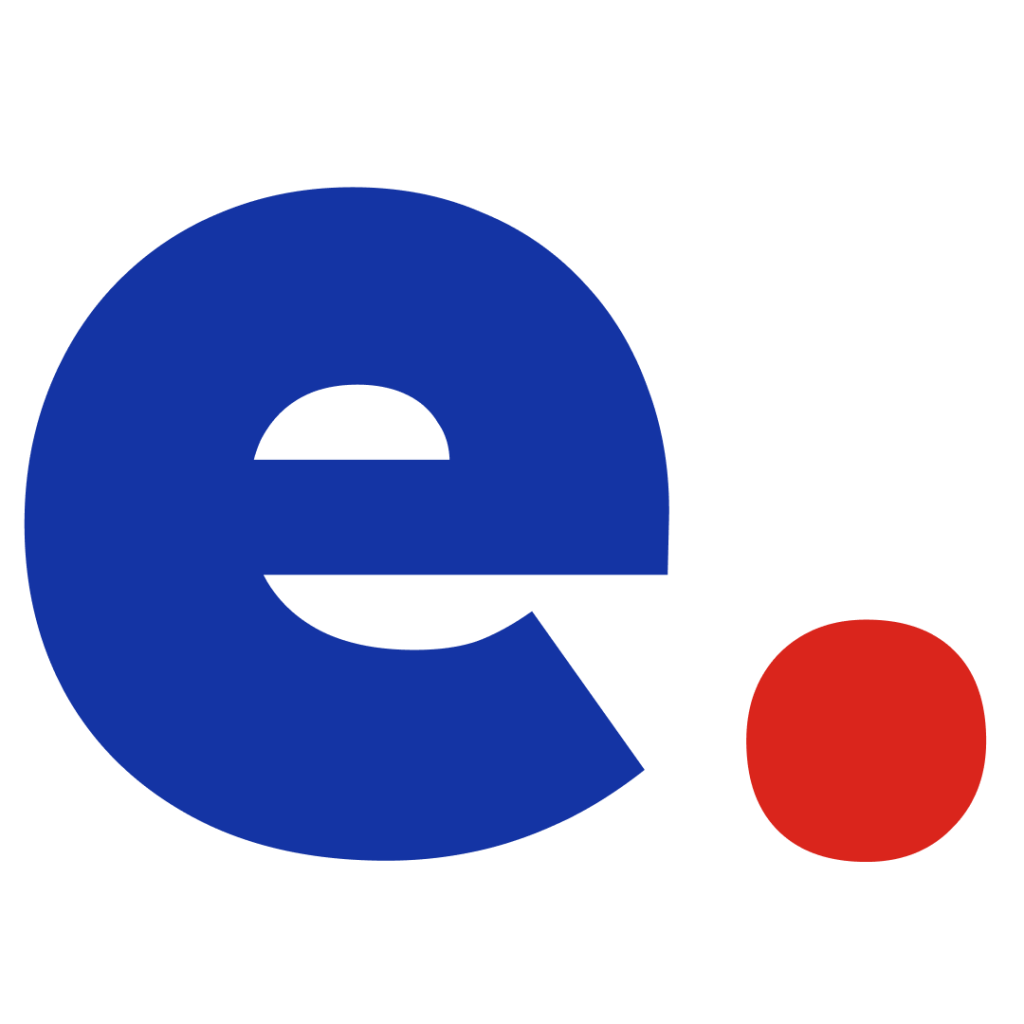The demand for freelance developers, engineers, and tech specialists is soaring as companies embrace flexible, remote-first models. Whether you’re a backend guru, WordPress expert, or full-stack engineer, the right platform can unlock serious opportunities, from long-term contracts to startup partnerships. With the global developer population projected to exceed 29 million in 2025, many are choosing freelancing for its autonomy.
Here’s a curated list of the best freelancing platforms for tech professionals, designed to match your skills with the workflows and expectations of the development world.

Flexable
Flexable is gaining traction in the US and India, boasting over 19,800 freelancers and 1,500 partnered agencies. More than a job board, it’s a community blending solo developers with agency-grade projects. Its curated onboarding and focus on quality make it ideal for tech pros seeking scalable coding and development roles.
Why It’s Great:
-
Strong growth in key tech markets
-
Combines solo and agency collaboration
-
Streamlined process ensures quality clients
The Downsides:
-
Global recognition still developing
-
Limited niche tech role diversity
-
Smaller client base for specialized skills
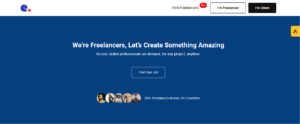
Toptal
Toptal’s rigorous vetting accepts only the top 3% of applicants, connecting elite developers with high-budget projects from top-tier tech companies. Tailored for seasoned software engineers, it’s perfect for those with robust portfolios targeting complex, high-value work.
Why It’s Great:
-
Elite clients with big budgets
-
High-value development projects
-
Vetting boosts credibility
The Downsides:
-
Highly selective entry process
-
Focused on tech and related fields
-
Not beginner-friendly

Arc
Arc connects developers with startups and tech companies worldwide, emphasizing long-term remote contracts. Its transparent screening ensures quality matches, making it ideal for mid- to senior-level coders seeking startup-centric ecosystems.
Why It’s Great:
-
Tailored for tech and startup talent
-
Remote-first, vetted client roles
-
Strong match quality for experienced developers
The Downsides:
-
Limited to developers and marketers
-
Fewer non-tech roles
-
Screening may delay onboarding
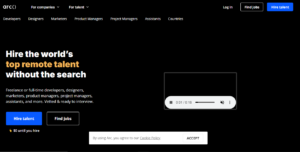
Upwork
Upwork remains a powerhouse in 2025, offering developers opportunities in web, mobile, and backend development. It serves startups and enterprises, with AI-driven job matching enhancing visibility for short-term gigs or long-term contracts.
Why It’s Great:
-
Diverse tech project categories
-
Trusted by global brands
-
Flexible project durations
The Downsides:
-
High competition for new developers
-
Fees range from 10% to 20%
-
Algorithm-driven visibility
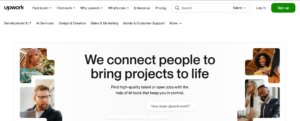
Fiverr
Fiverr’s fixed-price model suits developers offering specialized services like WordPress customization or API integration. Its intuitive platform and Fiverr Neo’s AI recommendations help craft tailored gigs and connect with clients efficiently.
Why It’s Great:
-
Ideal for niche, productized tech services
-
Quick setup for selling
-
Fiverr Neo enhances client matching
The Downsides:
-
Price competition lowers value
-
Limited gig customization
-
Ratings impact visibility

Freelancer.com
Freelancer.com’s marketplace lets developers bid on projects in software, mobile, and backend development. Its scale offers reach, but competition is fierce. A strong pitch and reviews can secure valuable tech projects.
Why It’s Great:
-
Massive global client base
-
Options for bids or contests
-
Broad tech industry coverage
The Downsides:
-
Bidding lowers earnings
-
Free plan limits visibility
-
Some jobs are low-budget
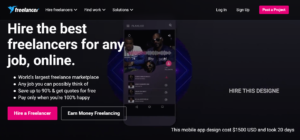
Guru.com
Guru offers developers flexibility in software and web development projects. Its SafePay and workroom tools ensure smooth collaboration, and lower fees make it appealing for steady tech gigs.
Why It’s Great:
-
Flexible payment options
-
User-friendly project tools
-
Competitive fees
The Downsides:
-
Smaller project volume
-
Dated interface
-
Limited freelancer marketing

PeoplePerHour
UK-based PeoplePerHour supports developers with gig-style and proposal-based projects in web and app development. Its transparent ratings make it viable for tech pros targeting English-speaking clients.
Why It’s Great:
-
Strong for development gigs
-
Flexible project options
-
Transparent ranking system
The Downsides:
-
Slower support responses
-
Budget-conscious clients
-
Limited non-English reach

LinkedIn’s Services Marketplace lets developers showcase coding services, while its job board lists freelance tech roles. Its strength is organic discovery through content and connections, ideal for active networkers.
Why It’s Great:
-
Professional credibility built-in
-
Networking drives tech leads
-
Robust job board integration
The Downsides:
-
Few freelance tools
-
Manual project tracking
-
Marketplace less mature in tech

Gun.io
Gun.io caters to software engineers, offering vetted, high-quality projects with US-based startups and tech firms. Its curated approach ensures developers see roles matching their expertise, ideal for experienced coders.
Why It’s Great:
-
Developer-focused vetting
-
High-trust US client base
-
Competitive project rates
The Downsides:
-
Selective entry process
-
Fewer short-term gigs
-
Limited international diversity

Codeable
Codeable is the premier platform for WordPress developers, offering projects in theme customization, plugin development, and site builds. Its careful matching ensures high-quality fits, reducing project friction.
Why It’s Great:
-
Exclusively for WordPress pros
-
High client and project quality
-
Hands-on matching boosts success
The Downsides:
-
WordPress-only focus
-
Competitive application process
-
Smaller project pool

Turing
Turing uses AI to match developers with long-term, full-time remote roles at US and global tech companies. Its pre-screening, including coding tests, streamlines onboarding for serious contracts.
Why It’s Great:
-
AI-driven job matching
-
Long-term remote tech roles
-
Vetted, reputable clients
The Downsides:
-
Extensive onboarding process
-
Limited part-time flexibility
-
Full-time role emphasis

Lemon.io
Lemon.io connects pre-vetted developers with startups, offering fast matches within days. It handles logistics and payments, letting coders focus on delivery, ideal for mid- to senior-level startup enthusiasts.
Why It’s Great:
-
Quick startup client matching
-
Manages logistics and payments
-
High-quality vetted developers
The Downsides:
-
Requires solid experience
-
Startup-focused projects
-
Live interviews for entry

Hired
Hired flips the model, letting companies apply to developers. Tech pros set availability and rates, attracting serious offers for contract or full-time roles, perfect for transitioning freelancers.
Why It’s Great:
-
Companies apply to you
-
Long-term tech contract roles
-
Transparent rate expectations
The Downsides:
-
Needs active, polished profiles
-
Not for one-off gigs
-
Limited non-English reach

Workana
Workana, originating in Latin America, offers tech projects in mobile, web, and backend development. Its multilingual support and payment options suit developers targeting global or regional clients.
Why It’s Great:
-
Strong global tech project base
-
Multilingual and payment flexibility
-
Diverse development categories
The Downsides:
-
Competitive pricing
-
Fewer enterprise projects
-
Less North American exposure

Final Takeaway
In 2025, tech freelancing thrives on precision, not volume. Whether you seek startup agility, WordPress niche work, or long-term stability, these platforms connect developers with clients who value expertise. Choose one that aligns with your skills and career goals to build a thriving tech career.
